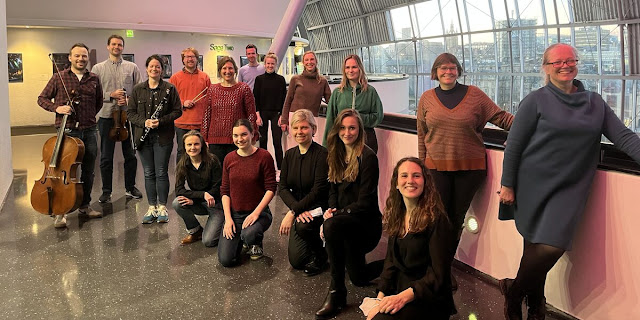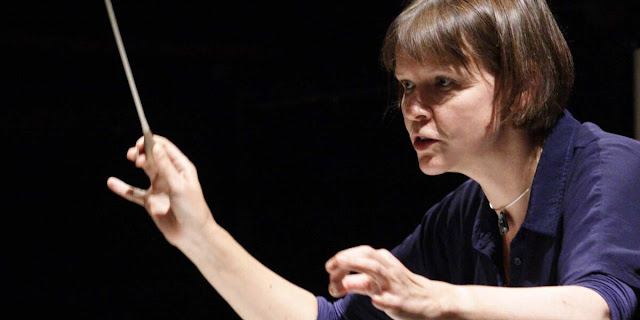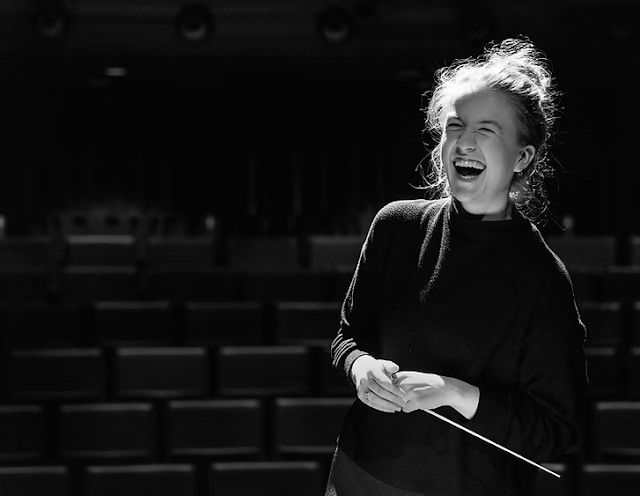 |
| Alice Farnham with members of the Royal Northern Sinfonia and members of the RPS Women Conductors programme at the Glasshouse including Charlotte Corderoy |
In 2014, conductor Alice Farnham formed the Women Conductors programme, initially at Morley College; she joined forces with the Royal Philharmonic Society (RPS) to create RPS Women Conductors in 2016, then in 2022, in partnership with the Royal Northern Sinfonia (RNS), a new high-level course was established in Gateshead at The Glasshouse International Centre for Music.
Now the programme is taking a new step and in June 2025 under the new name of RPS Conductors welcomed applications from any conductors at a sufficiently high level who can articulate how – through their lived experience, background or personal characteristics – they have encountered barriers to progress or limited access to an experience like this, and why it would therefore be transformative to their prospects.
This issue of women conductors far from resolved, however. In January 2025, 86% of conductors represented by UK artist managers were male, and 87% of titled conducting roles at UK orchestras were held by men. Addressing this remains a priority for RPS Conductors, and the opportunities presented remain primarily for women, trans and non-binary conductors.
 |
| Alice Farnham (Photo: Catherine Ashmore) |
I recently spoke to conductor Alice Farnham, about the programme from its early founding to the present day, and I also chatted to conductor Charlotte Corderoy who was part of that first intake, when the first course was run in Gateshead with the RNS.
In 2013, Marin Alsop conducted the Last Night of the Proms, the first woman to do so. This led to discussion both inside and outside classical music about why there were not more women conductors, why women were not coming through the system, or choosing not to study postgraduate conducting. Alice Farnham was aware that, despite encouragement, her own progress as a conductor had not been without difficulties. Plenty of women were simply not putting themselves in the position in the first place.
This was what might be termed Alice’s ‘lightbulb moment’ and for the 2014/2015 season she formed the Women Conductors programme (WoCo) at Morley College and then in 2016 WoCo moved under the auspices of the RPS, which means that the next cohort (that of 2026) will celebrate ten years of WoCo at the RPS. Within five years, things were shifting and more women were coming through as conductors, which had the advantage of encouraging more women to consider the idea. Through programmes in the UK, Australia and elsewhere, Alice has now taught over 500 women. Not all of these choose to become conductors, but many do.
Beginning in 2022, the collaboration with RNS created a high-level course aimed at women in the middle of their training. It was not simply aimed at young women, but also older women who for various reasons had either not considered taking up conducting or who had been discouraged. The course encouraged them to take up conducting later, though Alice acknowledges that it is harder taking up new things later. But they wanted to encourage women who are brilliant musicians and have so much to offer. It is harder also, in an industry which seems fascinated by youth and young conductors. WoCo has had various women, at different stages of their career, take up the challenge and Alice is very proud of what they have achieved.
When I spoke to Charlotte Corderory she was in rehearsals for Le Nozze di Figaro at Glyndebourne where she is assisting Riccardo Minasi on Mariame Clément‘s new staging. Charlotte took part in the programme’s pilot scheme in 2021, just out of the pandemic but still in a time of social distancing, and a few of the conductors on that pilot scheme were extended into the official first year of the programme.
 |
| Charlotte Corderoy |
For Charlotte, the programme was a game changer, she had not done any formal training and this was her first time in front of professional musicians. As she points out, this is something young conductors might not experience until high pressure situations such as auditions or masterclasses. The programme not only enabled her to work with professional players but with mentors such as Alice Farnham and get feedback which was delivered in a productive way. There was also the chance to explore new repertoire and work alongside other conductors who were at a similar point in their careers. That is was an all-female course meant that there were other women conductors in the room, there was camaraderie and a sense of the shared experience of being a female conductor, so you were encouraged and a safe space created.
There were six women on that pilot scheme, all were different, at different stages of their career. The majority were studying or had just completed their studies, but Charlotte had not started studying conducting. The programme took place the Summer before she went to the Royal Academy of Music (RAM) and it was a brilliant warm up. She found the experience fantastic, identifying things she wanted or needed to work on, but also recognising the things she got right, bolstering her confidence and working against imposter syndrome which is rife. She feels that it is important to believe you are good at it. Going to the RAM can feel intimidating, and Charlotte had not been to the Junior Academy and her undergraduate years were not at the RAM as she did a music degree at Oxford which was not particular performance focussed.
Her experience at the RAM was that it was wonderfully technique based, and the experience opened her mind to all sorts of questions including logistics and it was very people facing, working with a student orchestra which required a whole other skill set. Charlotte sees WoCo as a marvellous complement to this conservatoire training, the cherry on the cake being the incredibly high standard of orchestral playing from the RNS. The players in the RNS were encouraged to be very direct in rehearsal, and there were also tailored sessions done afterwards. And as everything was done live, it felt less like being criticised because any criticism could be productive, used as building blocks, putting things into practice the following day! It is the sort of thing that she feels any conductor would be pleased to experience.
She feels that the programme is helping to normalise the business. Charlotte never wanted the first thing people notice was that she was a woman. So, the programme serves a purpose, the more women that come through the programme, the more women can picture themselves in this position. She sees it as a process of making the discourse less about gender being talked about for the wrong reasons, putting things in the correct perspective.
Ever since founding WoCo, Alice was often asked ‘what was the ultimate goal?’ and she has always answered, until we do not need the programme any more. This is now being reflected in way the 2026 cohort, WoCo is adjusting its parameters, and being called the RPS Conductors programme.
Whilst the stats are still not brilliant, there are lots of women coming through and Alice quotes to me figures that demonstrate quite how much progress has been made. But as she points out, this sort of career takes time, and the test will be to see what is happening in ten years when the young women coming through are holding positions. After all, conducting careers are not made in a few years, but in decades!
For the 2026 cohort, Alice explains that the programme will be aimed not just at women but anyone whose lived experience is difficult, so that the programme addresses a wider range of inequalities. They are also open to people whose careers have chosen an unusual path or who have financial difficulties, after all as Alice points out choosing to study conducting does not come cheap.
For further information about the RPS Conductors Programme, see the website, along with information about the current application procedure.
- Charlotte is assisting Riccardo Minasi at Glyndebourne on Mozart’s Le Nozze di Figaro – 29 June to 21 August 2025, further details
- Charlotte will be conducting all four of Rachmaninov’s Piano Concertos in one concert with pianist Jeneba Kanneh-Mason, Boris Giltburg, Ryan Wang and Junyan Chen and the Philharmonia Orchestra at Bold Tendencies in Peckham – 13 September 2025, further details
- Alice will be conducting Donizetti’s The Elixir of Love with English Touring Opera, on tour from 27 September – 22 November 2025, further details
- Charlotte is conducting some performances of Offenbach’s The Tales of Hoffmann at Lyon Opera – 16 Dec 2025 to 5 Jan 2026, further details
The blog is free, but I’d be delighted if you were to show your appreciation by buying me a coffee.
Elsewhere on this blog
- A quartet of concerts ended a marvellous, fulfilling and enjoyable Aldeburgh Festival – concert review
- A vivid theatricality that a more conventional treatment might have missed: Bintou Dembélé & Leonardo García-Alarcón collaborate on a remarkable reinvention of Rameau’s Les Indes Galantes – opera review
- Robert & Clara: Stephan Loges & Jocelyn Freeman at SongEasel – concert review
- A vivid sense of style & stagecraft with some of the best Handel singers around: Rodelinda at Garsington – opera review
- A different focus: Timothy Ridout in Mozart & Hummel with Academy of St Martin in the Fields plus Rossini & a Weber symphony – concert review
- From Handel to Verdi & beyond: Soraya Mafi on singing in Handel’s Saul at Glyndebourne, expanding into bel canto & Bernstein – interview
- An alternative way people can encounter classical music: Baldur Brönnimann & Felix Heri introduce Between Mountains Festival – feature
- The BBC Symphony Orchestra’s visit to this year’s Aldeburgh Festival – concert review
- Brilliant reinvention & razor sharp take-down: Scottish Opera’s double-bill pairs Gilbert & Sullivan with Toby Hession’s brand new comedy – opera review
- A trio of concerts at this year’s Aldeburgh Festival highlights the diversity of music to be found on the Suffolk coast – concert review
- Home










